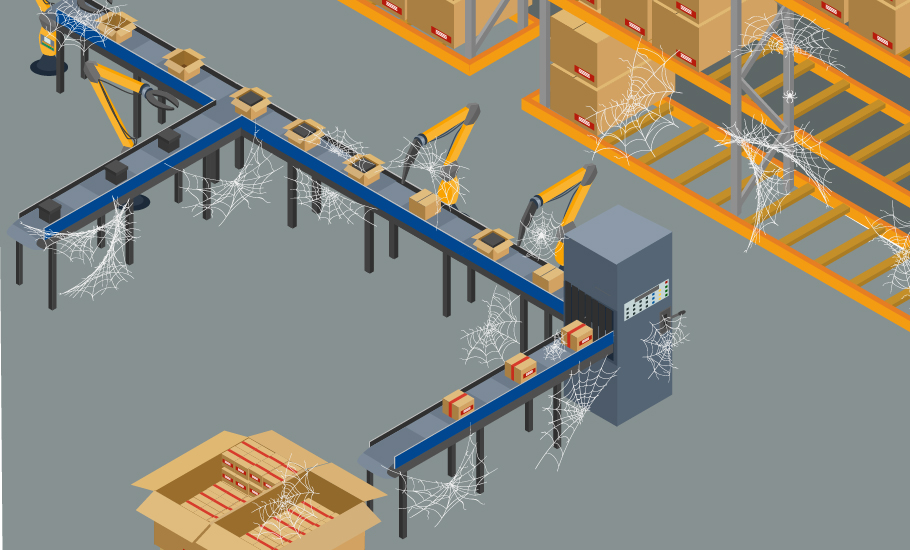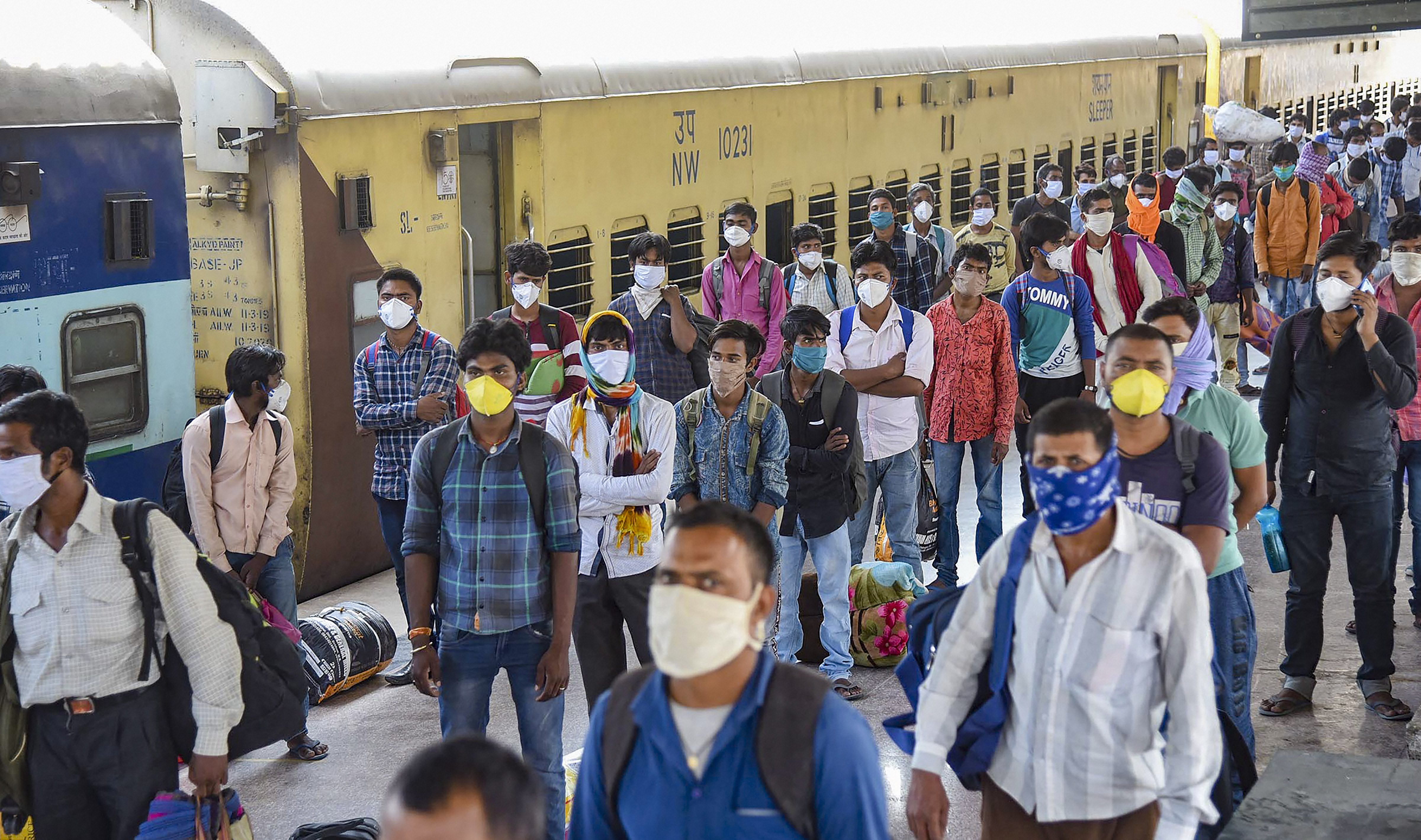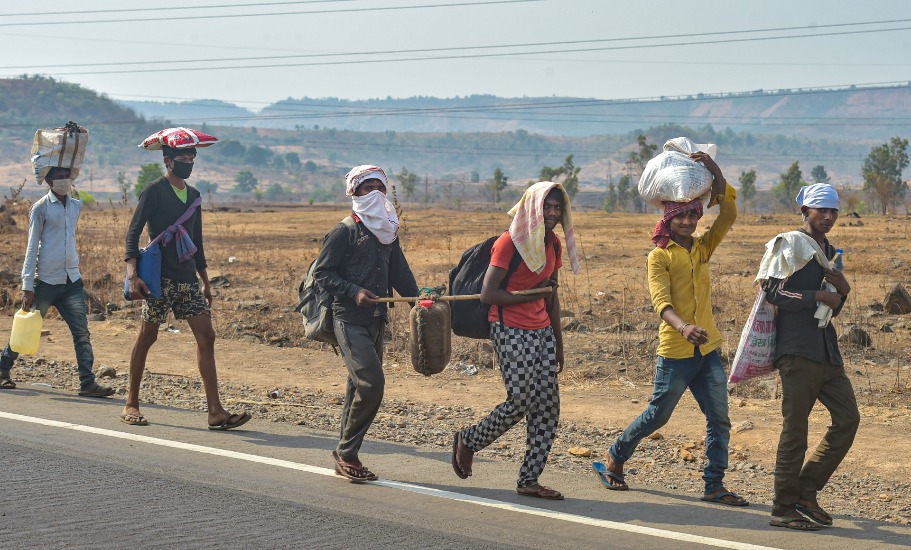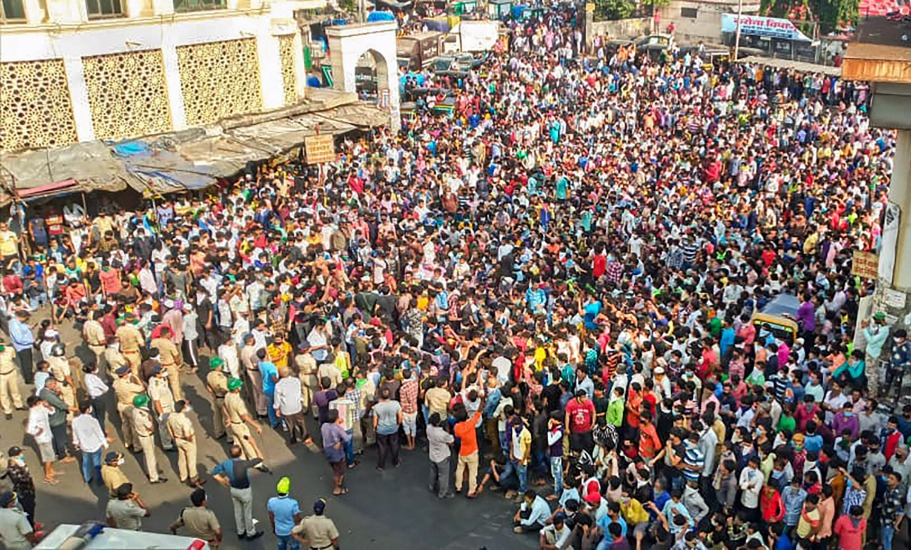
- Home
- News
- Analysis
- States
- Perspective
- Videos
- Education
- Entertainment
- Elections
- World Cup 2023
- Features
- Health
- Business
- Series
- Economy Series
- Earth Day
- Kashmir’s Frozen Turbulence
- India@75
- The legend of Ramjanmabhoomi
- Liberalisation@30
- How to tame a dragon
- Celebrating biodiversity
- Farm Matters
- 50 days of solitude
- Bringing Migrants Home
- Budget 2020
- Jharkhand Votes
- The Federal Investigates
- The Federal Impact
- Vanishing Sand
- Gandhi @ 150
- Andhra Today
- Field report
- Operation Gulmarg
- Pandemic @1 Mn in India
- The Federal Year-End
- The Zero Year
- Premium
- Science
- Brand studio
- Home
- NewsNews
- Analysis
- StatesStates
- PerspectivePerspective
- VideosVideos
- Entertainment
- ElectionsElections
- Sports
- Loading...
Sports - Features
- BusinessBusiness
- Premium
- Loading...
Premium

MSMEs struggle as migrant workers look to leave for home
Migrant workers say they would return from their homes only after there is clarity about the situation and the future. “We will leave now and will decide about coming back after a few months.”

Soon after the first phase of lockdown to contain COVID-19 was announced, Sonam Mittal, a migrant worker from Odisha working in a small foundry in SIDCO in Coimbatore, Tamil Nadu, decided to stay back as there was no public transport to take him home. Unlike thousands who were taken care of by their employers, many like Sonam stayed put in their rented accommodations while others were moved...
Soon after the first phase of lockdown to contain COVID-19 was announced, Sonam Mittal, a migrant worker from Odisha working in a small foundry in SIDCO in Coimbatore, Tamil Nadu, decided to stay back as there was no public transport to take him home.
Unlike thousands who were taken care of by their employers, many like Sonam stayed put in their rented accommodations while others were moved to relief camps by the authorities after attempts to walk hundreds of kilometres home.
“Back then, I did not know things would get this worse and that I would have to strive hard for two square meals,” he says.
Most of them were given groceries and essentials, but they say these are not enough and won’t last them for more than 10 days.
“How will we stay here without any support? How does the government expect us to survive with the 22 grocery items for one month?” asks M Vidhya, a native of Andhra Pradesh.
In the last over 40 days of lockdown, these workers have not paid a single penny. Sonam and 20 others from Odisha were brought to Coimbatore by a contractor, who fixed their wages and arranged their accommodation. As per this arrangement, the company doesn’t pay them directly, but does it through the contractor. However, since the lockdown, they haven’t got any wages. That is when they decided to leave for their homes.
But leaving this industrial city and reaching their homes thousands of kilometres away is impossible. A few migrant workers from southern states such as Andhra Pradesh, Karnataka and Telangana, working in textile mills, made multiple attempts to walk, but in vain. First, they were stopped by police and sent back; a week later, when they tried to walk again before sunrise, the highway patrol caught them and sent them back.
But as the lockdown has been relaxed and the Centre has allowed stranded workers to go home, many are now eager to take the train or bus — that is arranged by the respective state governments and in some cases, with the Railways — home.
While Andhra Pradesh and Kerala have facilitated travel for migrant workers back to Jharkhand and Odisha respectively, the Tamil Nadu government has been unsure of sending the workers back.
Dependence on migrant workers
A key reason for this is the concern raised by micro, small and medium industrialists who believe that they may not be able to operate in full force even after the lockdown is relaxed and industries are allowed to operate because they depend a lot on these migrant workers.
Coimbatore Tirupur District Micro and Cottage Entrepreneur Association (COTMA) president C Sivakumar says that it will be very difficult to run the business once the migrant workers leave for their native place.

“The industry is mostly dependent on the migrant workers and once they leave to their native place, at least they would take another 4–6 months to return. In between, we don’t know whether we will be able to run the industries with the available manpower,” says Sivakumar.
Taking care of workers
Some owners had even taken care of food and accommodation and even salaries of their workers after the lockdown.
KPR Mills in Coimbatore, which employs about 22,000 workers, has done this for about 17,500 migrant workers who are from other districts of Tamil Nadu, Odisha, Kerala, Karnataka, Andhra Pradesh, Bihar, Assam and Himachal Pradesh.
“All these days, we have been getting work from them. And now, leaving them in lurch during such a crisis is not right,” reasoned KP Ramasamy, chairman of KPR Mills. “So we continue to give them food and shelter in our own premises, maintaining social distancing.”
The mill has paid March salaries and is contemplating on giving April salaries. Fortunately for him, the state government sought help for packing grocery items for one lakh migrant workers stranded in various parts of the state.
“We have received the groceries and have deployed our people in packing the groceries. Apart from that, since we are in the garment sector, we also managed to supply face masks for Coimbatore and Tiruppur (municipal) corporations with the help of our workers,” shares Ramasamy.
The mill is also making safety gear for healthcare workers for other states such as Telangana and Odisha.
This was not the case with K Kanakaraj, owner of a small lathe unit, which is involved in making machine parts and tools on a small scale and employs five workers. With the lockdown, orders have run out and his clients haven’t paid dues of over three months. On top of this, he has been paying each of his workers ₹5,000 for essentials as against their normal monthly salaries of ₹20,000.

“I have to shell out about ₹25,000. Though the amount is far less compared to their salaries in total, I have to arrange this funds through loans as I have no source of income now as the payments for the work done are due for over 90 days,” he shares.
Kanakaraj says he is lucky to have workers who understand the situation and are not demanding. But again, if they have to travel back to their native places, he has to shell out a few more thousands. All this has caused him a loss of ₹5 lakh, he says, especially due to non-payment of dues and inoperative business.
Not gonna stay back
Whatever help you give them, Ramasamy says, these migrants would want to go home.
“By the end of this lockdown period, it would be several months since they visited their native places. And the workers are worried about their families living far away. So obviously, they may want to go to their native,” he says, adding that so far 30% of the people have registered their wish to return.
Sonam and others worry that their families back home won’t be able to manage as they are not able to send money back home as they used to in normal times.
“I am managing with the food being provided by the NGOs and government, but my wife and children in my native have nobody to provide food like this. They are dependent on my salary. At least, if I am around them, I can do farming in my village and feed them,” says R Sidharth, another migrant worker, who stays with Sonam. He is confident that he would get a job even after six months, but cannot afford to stay away from his family now during a crisis.
Most MSMEs involved in manufacturing have about 80% migrant workers and while some have managed to take care of them till now, the situation could get difficult after a week, says J James, Tamil Nadu Association of Cottage and Micro Enterprises, citing plummeting resources and lack of business.
“But after lockdown, we don’t see any hope of surviving. Migrant workers will definitely leave,” he says.

Sudden lockdown disrupted business
He rues that the sudden lockdown announcement has ruined their business.
“The industries just started getting orders by March after a delay of two months, which is when the usual business picks up. But even before we could plan things as per the orders, the lockdown has ruined our lives,” he says.
“Earlier, we were fighting for the orders and for the prices. Now, we don’t know when we will be getting the orders next and when we can function normally,” says S Kandhasamy, a powerloom owner in Palladam in Tirupur district.
The Union government said it would come out with relief packages for the MSMEs to survive. “But, there has been absolutely nothing for the MSMEs to benefit. Even if one wants to shut his unit, he can do it only after paying the rent for the workspace since our machines were all there in the place. But from where will we get the money and pay the rent?” asks James.
“Despite all the crisis, the government threatens to take action if we fail to pay employees during this lockdown time. But we don’t have any resources and even to feed our workers, we have to borrow money and seek help from volunteers in the city,” he says.
On the other hand, Coimbatore district Small Scale Industries Association (CODISSIA) has demanded the Union government to pay the wages for their employees, from the Employees’ State Insurance fund and Employees’ Provident Fund, which they would pay back once the situation bounces back to normal.
“With the ongoing crisis, when the survival of the industrialists itself is difficult and with no source of income, how are we supposed to pay them the wages? But we understand the employees should not be left to suffer. It would be better if the Union Government takes care of the employees at the time of crisis and we would pay back the arrear ESI and PF funds after a breathing time of six months,” says Sivakumar of COTMA.
Most of the industrialists also demand that the Union government should give them a relaxation period of six months to repay pending bank loans and not charge interest during this period of time.
“The banks should also give us enough time and should not declare any small micro and medium scale industries as NPAs for some time, until we recover from the losses due to the lockdown,” says Ramamurthy, president, CODISSIA.
Ramya, who works with her mother in a garments unit near Karumathampatty in Coimbatore, says they would return from their homes in Andhra Pradesh only after there is clarity about the situation and the future. “We will leave now and will decide about coming back after a few months.”

